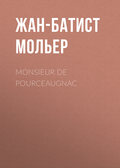
Мольер (Жан-Батист Поклен)
The Love-Tiff
SCENE IX. – VALÈRE, ALBERT, LUCILE, MASCARILLE
MASC. Signor Albert, at least be silent. At length, madam, everything conspires to make your happiness complete. Your father, who is informed of your love, leaves you your husband and gives his permission to your union, provided that, banishing all frivolous fears, a few words from your own mouth corroborate what we have told him.
LUC. What nonsense does this impudent scoundrel tell me?
MASC. That is all right. I am already honoured with a fine title.
LUC. Pray, sir, who has invented this nice story which has been spread about today?
VAL. Pardon me, charming creature. My servant has been babbling; our marriage is discovered, without my consent.
LUC. Our marriage?
VAL. Everything is known, adorable Lucile; it is vain to dissemble.
LUC. What! the ardour of my passion has made you my husband?
VAL. It is a happiness which causes a great many heart-burnings. But I impute the successful result of my courtship less to your great passion for me than to your kindness of heart. I know you have cause to be offended, that it was the secret which you would fain have concealed. I myself have put a restraint on my ardour, so that I might not violate your express commands; but…
MASC. Yes, it was I who told it. What great harm is done?
LUC. Was there ever a falsehood like this? Dare you mention this in my very presence, and hope to obtain my hand by this fine contrivance? What a wretched lover you are – you, whose gallant passion would wound my honour, because it could not gain my heart; who wish to frighten my father by a foolish story, so that you might obtain my hand as a reward for having vilified me. Though everything were favourable to your love – my father, fate, and my own inclination – yet my well-founded resentment would struggle against my own inclination, fate, and my father, and even lose life rather than be united to one who thought to obtain my hand in this manner. Begone! If my sex could with decency be provoked to any outburst of rage, I would let you know what it was to treat me thus.
VAL. (To Mascarille). It is all over with us; her anger cannot be appeased.
MASC. Let me speak to her. Prithee, madam, what is the good of all these excuses? What are you thinking of? And what strange whim makes you thus oppose your own happiness? If your father were a harsh parent, the case would be different, but he listens to reason; and he himself has assured me that if you would but confess the truth, his affection would grant you everything. I believe you are a little ashamed frankly to acknowledge that you have yielded to love; but if you have lost a trifling amount of freedom, everything will be set to rights again by a good marriage. Your great love for Valère may be blamed a little, but the mischief is not so great as if you had murdered a man. We all know that flesh is frail, and that a maid is neither stock nor stone. You were not the first, that is certain; and you will not be the last, I dare say.
LUC. What! can you listen to this shameless talk, and make no reply to these indignities?
ALB. What would you have me say? This affair puts me quite beside myself.
MASC. Upon my word, madam, you ought to have confessed all before now.
LUC. What ought I to have confessed?
MASC. What? Why, what has passed between my master and you. A fine joke, indeed!
LUC. Why, what has passed between your master and me, impudent wretch?
MASC. You ought, I think, to know that better than I; you passed that night too agreeably, to make us believe you could forget it so soon.
LUC. Father, we have too long borne with the insolence of an impudent lackey. (Gives him a box on the ear).
SCENE X. – ALBERT, VALÈRE, MASCARILLE
MASC. I think she gave me a box on the ear.
ALB. Be gone! rascal, villain! Her father approves the way in which she has made her hand felt upon your cheek.
MASC. May be so; yet may the devil take me if I said anything but what was true!
ALB. And may I lose an ear if you carry on this impudence any further!
MASC. Shall I send for two witnesses to testify to the truth of my statements?
ALB. Shall I send for two of my servants to give you a sound thrashing?
MASC. Their testimony will corroborate mine.
ALB. Their arms may make up for my want of strength.
MASC. I tell you, Lucile behaves thus because she is ashamed.
ALB. I tell you, you shall be answerable for all this.
MASC. Do you know Ormin, that stout and clever notary?
ALB. Do you know Grimpant, the city executioner?
MASC. And Simon, the tailor, who used formerly to work for all the people of fashion?
ALB. And the gibbet set up in the middle of the market-place?
MASC. You shall see they will confirm the truth of this marriage.
ALB. You shall see they will make an end of you.
MASC. They were the witnesses chosen by them.
ALB. They shall shortly revenge me on you.
MASC. I myself saw them at the altar.
ALB. And I myself shall see you with a halter.
MASC. By the same token, your daughter had a black veil on.
ALB. By the same token, your face foretells your doom.
MASC. What an obstinate old man.
ALB. What a cursed rascal! You may thank my advanced years, which prevent me from punishing your insulting remarks upon the spot: but I promise you, you shall be paid with full interest.
SCENE XI. – VALÈRE, MASCARILLE
VAL. Well, where is now that fine result you were to produce…?
MASC. I understand what you mean. Everything goes against me: I see cudgels and gibbets preparing for me on every side. Therefore, so that I may be at rest amidst this chaos, I shall go and throw myself headlong from a rock, if, in my present despair, I can find one high enough to please me. Farewell, sir.
VAL. No, no; in vain you wish to fly. If you die, I expect it to be in my presence.
MASC. I cannot die if anybody is looking on: it would only delay my end.
VAL. Follow me traitor; follow me. My maddened love will soon show whether this is a jesting matter or not.
MASC. (Alone). Unhappy Mascarille, to what misfortunes are you condemned to-day for another's sin!
* * * * *
ACT IV
SCENE I. – ASCANIO, FROSINE
FROS. What has happened is very annoying.
ASC. My dear Frosine, fate has irrevocably decreed my ruin. Now the affair has gone so far, it will never stop there, but will go on; Lucile and Valère, surprised at such a strange mystery, will, one day, try to find their way amidst this darkness, and thus all my plans will miscarry. For, whether Albert is acquainted with the deception, or whether he himself is deceived, as well as the rest of the world, if ever it happens that my family is discovered, and all the wealth he has wrongfully acquired passes into the hands of others, judge if he will then endure my presence; for, not having any interest more in the matter, he will abandon me, and his affection for me will be at an end. Whatever, then, my lover may think of my deception, will he acknowledge as his wife a girl without either fortune or family?
FROS. I think you reason rightly; but these reflections should have come sooner. What has prevented you from seeing all this before? there was no need to be a witch to foresee, as soon as you fell in love with Valère, all that your genius never found out until to-day. It is the natural consequence of what you have done; as soon as I was made acquainted with it I never imagined it would end otherwise.
ASC. But what must I do? There never was such a misfortune as mine. Put yourself in my place, and give me advice.
FROS. If I put myself in your place, you will have to give me advice upon this ill-success; for I am you, and you are I. Counsel me, Frosine, in the condition I am in. Where can we find a remedy? Tell me, I beg of you.
ASC. Alas! do not make fun of me. You show but little sympathy with my bitter grief, if you laugh in the midst of my distress.
FROS. Really, Ascanio, I pity your distress, and would do my utmost to help you. But what can I do, after all? I see very little likelihood of arranging this affair so as to satisfy your love.
ASC. If no assistance can be had, I must die.
FROS. Die! Come, come; it is always time enough for that. Death is a remedy ever at hand; we ought to make use of it as late as possible.
ASC. No, no, Frosine. If you and your invaluable counsels do not guide me amidst all these breakers, I abandon myself wholly to despair.
FROS. Do you know what I am thinking about? I must go and see the… But here comes Éraste; he may interrupt us. We will talk this matter over as we go along. Come, let us retire.
[Footnote: Frosine means by "the…" the woman who knows the secret of all this intrigue, and who is supposed to be the mother of Ascanio. This is explained later on in Act V., Scene 4]
SCENE II. – ÉRASTE, GROS-RENÉ
ERAS. You have failed again?
GR. – RE. Never was an ambassador less listened to. No sooner had I told her that you desired to have a moment's conversation with her, than, drawing herself up, she answered haughtily, "Go, go, I value your master just as much as I do you; tell him he may go about his business;" and after this fine speech she turned her head away from me and walked off. Marinette, too, imitating her mistress, said, with a disdainful sneer, "Begone, you low fellow," and then left me; so that your fortune and mine are very much alike.
[Footnote: In the original it is beau valet de carreau. Littré, in his "Dictionaire de la langue francaise," says that this word which means literally "knave of diamonds," was considered an insult, because in the old packs of cards of the beginning of the seventeenth century, that knave was called valet de chasse, hunting servant, a rather menial situation; while the knave of spades, valet de pique, was called, nobleman's servant; the knave of hearts, valet de coeur, valet de cour, court servant; and the knave of clubs, valet de trefle, valet de pied, foot servant.]
ERAS. What an ungrateful creature, to receive with so much haughtiness the quick return of a heart justly incensed. Is the first outburst of a passion, which with so much reason thought itself deceived, unworthy of excuse? Could I, when burning with love, remain insensible, in that fatal moment, to the happiness of a rival? Would any other not have acted in the same way as I did, or been less amazed at so much boldness? Was I not quick in abandoning my well-founded suspicions? I did not wait till she swore they were false. When no one can tell as yet what to think of it, my heart, full of impatience, restores Lucile to her former place, and seeks to find excuses for her. Will not all these proofs satisfy her of the ardour of my respectful passion? Instead of calming my mind, and providing me with arms against a rival who wishes to alarm me, this ungrateful woman abandons me to all the tortures of jealousy, and refuses to receive my messages and notes, or to grant me an interview. Alas! that love is certainly very lukewarm which can be extinguished by so trifling an offence; that scornful rigour, which is displayed so readily, sufficiently shows to me the depth of her affection. What value ought I to set now upon all the caprices with which she fanned my love? No! I do not pretend to be any longer the slave of one who has so little love for me; since she does not mind whether she keeps me or not, I will do the same.
GR. – RE. And so will I. Let us both be angry, and put our love on the list of our old sins; we must teach a lesson to that wayward sex, and make them feel that we possess some courage. He that will bear their contempt shall have enough of it. If we had sense enough not to make ourselves too cheap, women would not talk so big. Oh! how insolent they are through our weakness! May I be hanged if we should not see them fall upon our neck more often than we wished, if it was not for those servilities with which most men, now-a-days, continually spoil them.
ERAS. As for me, nothing vexes me so much as contempt; and to punish her's by one as great, I am resolved to cherish a new passion.
GR. – RE. So will I, and never trouble my head about women again. I renounce them all, and believe honestly you could not do better than to act like me. For, master, people say that woman is an animal hard to be known, and naturally very prone to evil; and as an animal is always an animal, and will never be anything but an animal, though it lived for a hundred thousand years, so, without contradiction, a woman is always a woman, and will never be anything but a woman as long as the world endures.
[Footnote: This passage is paraphrased from Erasmus, Colloquia familiaria et Encomium Moriae, in which, after having called a woman animal stultum atque ineptum verum ridiculum, et suave, Folly adds, Quemadmodum, juxta Graecorum proverbium, simia semper est simia, etiamsi purpura vestiatur, ita mulier semper mulier est, hoc est stulta, quamcunque personam induxerit.]
Wherefore, as a certain Greek author says: a woman's head is like a quicksand; for pray, mark well this argument, which is most weighty: As the head is the chief of the body, and as the body without a chief is worse than a beast, unless the chief has a good understanding with the body, and unless everything be as well regulated as if it were measured with a pair of compasses, we see certain confusions arrive; the animal part then endeavours to get the better of the rational, and, we see one pull to the right, another to the left; one wants something soft, another something hard; in short, everything goes topsy turvy. This is to show that here below, as it has been explained to me, a woman's head is like a weather-cock on the top of a house, which veers about at the slightest breeze; that is why cousin Aristotle often compares her to the sea; hence people say that nothing in the world is so stable as the waves.
[Footnote: Though "stable" is here used, it is only employed to show the confusion of Gros-René's ideas, who, of course, wishes to say "unstable."]
Now, by comparison – for comparison makes us comprehend an argument distinctly, – and we learned men love a comparison better than a similitude, – by comparison, then, if you please, master, as we see that the sea, when a storm rises, begins to rage, the wind roars and destroys, billows dash against billows with a great hullabaloo, and the ship, in spite of the mariner, goes sometimes down to the cellar and sometimes up into the garret; so, when a woman gets whims and crotchets into her head, we see a tempest in the form of a violent storm, which will break out by certain … words, and then a … certain wind, which by … certain waves in … a certain manner, like a sand-bank … when … In short, woman is worse than the devil.
[Footnote: This long speech of Gros-René ridicules the pedantic arguments of some of the philosophers of the time of Molière. It also attributes to the ancients some sayings of authors of the day; for example, the comparison, from a Greek author, "that a woman's head is like a quicksand," is from a contemporary; the saying from Aristotle, comparing woman to the sea, is from Malherbe. Words very familiar look more homely when employed with high-flown language, and Gros-René's speech is no bad example of this, whilst at the same time it becomes more muddled the longer it goes on. There exists also a tradition that the actor who performs the part of Gros-René should in order to show his confusion, when he says "goes sometimes down the cellar," point to his head, and when he mentions "up into the garret," point to his feet.]
ERAS. You have argued that very well.
GR. – RE. Pretty well, thanks to Heaven; but I see them coming this way, sir, – stand firm.
ERAS. Never fear.
GR. – RE. I am very much afraid that her eyes will ensnare you again.







